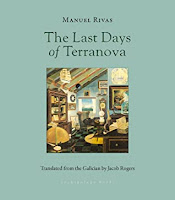Book Review: The Last Days of Terranova by Manuel Rivas (translated by Jacob Rogers)
My Rating: ⭐⭐⭐⭐
“I can picture the eyes poring over the last of the books, weighing their value, their health, color, musculature, and the state of their spines, meanwhile the books are in a state of shock as they feel the ground vanish out from under them.”
The Last Days of Terranova by Manuel Rivas (translated by Jacob Rogers) revolves around a family-owned bookstore in Galicia, Spain that is facing closure and the property to be handed over to real estate developers. As the story begins, we meet Vicenzo Fontana in 2014 as he broods over the imminent closure of The Terranova Bookstore, that has been in his family for decades, the fruition of his mother Comba’s dream to own her bookstore - the plans for which started taking shape in 1935. Her father, Vincenzo’s grandfather, worked very hard, in his lifetime, to make her dreams come true. Finally in 1946, she opened the store, marrying her husband Amaro the following year.
The story of the Terranova Bookstore and its owners is inextricably linked to the changing political and social landscape of the country and the surrounding region and moves through the years of the Francoist regime and the censorship of literature and the exile of intellectuals through the years to the democratic transition in the 1970s and the present day plagued by failing local independent businesses and economic recession. The narrative moves back and forth between various points of time in the past and the present day.
Vicenzo is dejected as he prepares for the liquidation of his inventory. He spends the last few days in his store with his dog, a few of the family's long time employees (who are more like family than staff), and a new friend who has turned to him for help. As he prepares for the closure of the store and his imminent eviction from the property his memories take him back to the people and the events that have shaped his life.
“What did it matter if one bookstore closed, when so many other shops were closing too? A hole, an empty space, another hole. Emptiness grows, but due to its nature no one notices its reign until they find themselves trapped inside it. The eviction of souls, the cheapening of the imagination, the loss of oxygen.”
Vincenzo’s father, Amaro, a scholar of classical languages known for his passion for Homer’s Odyssey and a member of the Seminary of Galician Studies, loses his teaching job during the regime and devotes his time to the bookstore and writing articles under the pseudonym “Polytropos”, hosting intellectuals and facilitating debates and discussions and along with Vincenzo's Uncle Eliseo, facilitates the smuggling of banned books by emigrants and travelers in false bottomed suitcases across the seas and borders. They earn the reputation of a “banned book provider", acquiring books written by authors in exile and translations of international works banned in Francoist Spain, braving inquiries, interrogations, informants and targeted raids through the years. Vincenzo, having suffered from polio and undergone a long, painful treatment using Iron Lung apparatus in the Marine Sanitarium as a child, found comfort among the shelves of the bookstore where his love for books and reading was nurtured. He also dreamed of leaving Galicia and did spend some of his early adult years in Madrid, returning with his friend Garua, an Argentinian revolutionary on the run, when it becomes unsafe for them to remain in Madrid in the aftermath of General Franco’s demise in the mid-1970s, gradually becoming more involved with the store.
The vivid descriptions of the bookstore with its owners and their friends, family and patrons, the historical backdrop and the numerous literary references make for an absorbing read. It does take a bit of effort to get used to the jumping timelines. Though we meet several characters whose stories are interwoven throughout the novel, nowhere did I feel that the author digressed from the main narrative and I did not lose interest at any point. With its beautiful prose and nostalgic tone, superb characterizations and relevant themes, this is an immersive and thought-provoking read that not only highlights the role of bookstores, books and literature in the lives of those who find comfort and solace in reading but also emphasizes the power of the written word in preserving history and instigating change and advancement of society as a whole. This was my first time reading Manuel Rivas and I was not disappointed!
“The link between a person’s life and what they like to read is unpredictable. According to the saying, we are what we read. But it could just as easily be said that we are what we don’t read.”
Many thanks to Archipelago Books and NetGalley for the digital review copy of this novel. All opinions expressed in this review are my own. This book is due to be released on October 11. 2022.

Comments
Post a Comment